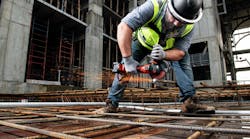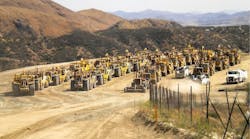Some of that new equipment smell will have rubbed off, but leasing used equipment can be advantageous while you are stretching your cash flow.
According to the research arm of the Equipment Leasing and Finance Association (ELFA), about one-third of construction equipment was leased in 2013, and ELFA is already seeing a marked increase this year over last year. The stats on propensity to finance construction machinery breakdown like this:
• lease, 31 percent
• cash, 21 percent
• credit card, 18 percent
• secured, 17 percent
• line of credit, 9 percent
• other, 4 percent
Zac Dalton, manager of national strategic accounts with Ritchie Bros., says the reasons companies lease used equipment are essentially the same as why they lease new vehicles: typically there is no down payment, maintenance costs can be included in the lease, flexibility for an equipment/technology upgrade, and operating lease payments are 100 percent tax deductible. (Note: check with your own qualified financial professional.) The difference—and upside—to leasing used equipment is that the fair market value of the machine is lower, so if a residual is in play, your payment will be less as well. The rule of thumb is that the higher your residual, the lower your monthly payment.
Dalton offers these leasing tips:
• Negotiate everything: Equipment price, residual, end-of-lease options, early buyout, fair market value at end of term (if it applies), documentation fees, security deposits, personal guarantees, advance payments, return provisions, etc.
• Look at prepay options: Can you get out of the lease if you need to do so? What penalties are generally in place and what will it take to mitigate them?
• End-of-Lease Notifications: Beware of the perpetual lease. It is not uncommon for leasing companies to continue to bill “Lease Renewals” after the agreed-upon term has ended. It is easy to miss line items when a company is authorized to automatically withdraw funds from your account. The leasing companies need proper notice from you that your lease and obligations are finished. Notify them in writing by certified mail. Granted, a phone call or email is easier, but having hardcopy proof that you gave them notice strengthens your argument if there is a discrepancy in your billing.
Leases come in several configurations applicable to used construction equipment.
• Operating Lease. Also known as an Off Balance Sheet lease. In an Operating Lease the owner transfers only the right to use the equipment to the contractor. At the end of the lease period, the contractors returns the equipment to the owner. Since the contractor doesn’t assume any risk of ownership, these leases can be attractive to meet financial covenants and/or debt to equity ratios. The residual is not set, and will be calculated at the fair market value at the end of the lease term.
• Capital Lease: A Capital Lease is used when ownership of the equipment is transferred to the contractor at the end of the lease term. Both Operating and Capital leases require the same commitment from the contractors.
• Sale/Leaseback: Contractors with equipment that is owned free and clear (or have substantial equity in the equipment) have another lease option. In a Sale/Leaseback lease, the contractor sells his equipment to a leasing company, which in turn leases it back to the original owner. Contractors do this when they are in a cash flow crunch or believe they can use the money better elsewhere.
• TRAC Lease: For contractors who lease haul trucks, a TRAC ( terminal rental adjustment clause, sometimes referred to as open-end lease) is an option. TRAC leases are for over-the-road motor vehicles only, such as trucks, and does not pertain to all industries. They provide a guaranteed residual up front, unlike the operating lease in which you don’t know your residual until the end. At the end of the lease, the residual amount may be re-financed, paid off, or the truck can be returned and sold for fair market value. If the truck sells for less, you will owe the difference.



